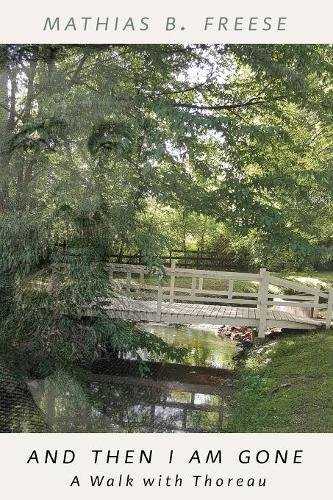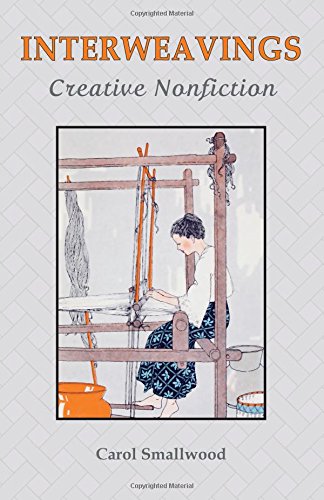 Not only do Freese and I concur on how a psychotherapist best engages with a client, but our approach to writing books also bisects. I too write to try to understand myself, indeed without outlines or a rigid plot structure. I daresay he would nod eagerly in understanding that your characters, given the chance, tell the story for you if you’ll listen to them, and in a more honest, exciting way.
Not only do Freese and I concur on how a psychotherapist best engages with a client, but our approach to writing books also bisects. I too write to try to understand myself, indeed without outlines or a rigid plot structure. I daresay he would nod eagerly in understanding that your characters, given the chance, tell the story for you if you’ll listen to them, and in a more honest, exciting way.
Category: Non fiction reviews
A review of Interweavings by Carol Smallwood
 Interweavings rings a perspective that prompts readers to go beyond an interpretation of Smallwood’s stories as descriptive pieces, to a body of work that provides a faceted look at the small moments of life that communicates deeper meanings and speaks to experiences Smallwood narrates from her reflections across her lifetime.
Interweavings rings a perspective that prompts readers to go beyond an interpretation of Smallwood’s stories as descriptive pieces, to a body of work that provides a faceted look at the small moments of life that communicates deeper meanings and speaks to experiences Smallwood narrates from her reflections across her lifetime.
Environmental Justice: Nature and Nation, Wealth and Waste in Carl A. Zimring’s scholarship (Clean and White)
 Some questions remain. How will different perspectives be reconciled? How will a nation’s citizens conserve what is good, while achieving progress beyond what is bad? How will people get what they need from the earth, while still protecting the land—and respecting all its people? True prophecy is rare—and arrogance can lead to destruction.
Some questions remain. How will different perspectives be reconciled? How will a nation’s citizens conserve what is good, while achieving progress beyond what is bad? How will people get what they need from the earth, while still protecting the land—and respecting all its people? True prophecy is rare—and arrogance can lead to destruction.
A review of Kylie’s Ark by Rita Welty Bourke
 It’s invariably true that Herriot’s animal stories ended happily, as she notes. Her stories, well, invariably do not. They resist a chipper ending and, indeed, conspire to break her heart. Being a veterinary student certainly is no picnic for her, but when she’s finally graduated and chosen to set up her practice, the life still is no picnic. Not that Wheeler wishes it was! Her last words confess that she’ll look for another line of work if she ever stops struggling to save suffering animals in her care.
It’s invariably true that Herriot’s animal stories ended happily, as she notes. Her stories, well, invariably do not. They resist a chipper ending and, indeed, conspire to break her heart. Being a veterinary student certainly is no picnic for her, but when she’s finally graduated and chosen to set up her practice, the life still is no picnic. Not that Wheeler wishes it was! Her last words confess that she’ll look for another line of work if she ever stops struggling to save suffering animals in her care.
A review of The Memoirs of Billy Shears by Thomas E Harriet
 Suggestions that the original Paul was getting a little too big for his britches, that his interests were veering into subversive areas and that he was considering using his notoriety and influence to confront some of the bedrock pretenses of the world he lived in, abound on internet forums devoted to this topic. Perhaps one day even this stunning tome will be superseded by yet another more revelatory dissertation that tells the whole truth. It could well be that a still more unimaginable, mind-blowing story is waiting in the wings.
Suggestions that the original Paul was getting a little too big for his britches, that his interests were veering into subversive areas and that he was considering using his notoriety and influence to confront some of the bedrock pretenses of the world he lived in, abound on internet forums devoted to this topic. Perhaps one day even this stunning tome will be superseded by yet another more revelatory dissertation that tells the whole truth. It could well be that a still more unimaginable, mind-blowing story is waiting in the wings.
A review of Imperial Plots by Sarah Carter
 Government and Canadian Pacific Railway officials (all men), subscribed to the myths that women lacked the technological and physical ability to farm successfully. In practice, wives and daughters of homesteaders frequently performed hard physical toil and operated machinery. Carter’s study uncovered many women who farmed and ranched, some quite successfully.
Government and Canadian Pacific Railway officials (all men), subscribed to the myths that women lacked the technological and physical ability to farm successfully. In practice, wives and daughters of homesteaders frequently performed hard physical toil and operated machinery. Carter’s study uncovered many women who farmed and ranched, some quite successfully.
A review of Writing True Stories by Patti Miller
 Miller, the “writing whisperer” as Jessica Rowe puts it, has created a vital guide to memoir and other forms of creative nonfiction. Though there are many how-to guides on the market, this one is special, both for its depth of wisdom – Miller has over 26 years of experience in teaching others how to write creative nonfiction, as well as her own experience as a nonfiction author/memoirist – and for the simplicity and practicality of its approach.
Miller, the “writing whisperer” as Jessica Rowe puts it, has created a vital guide to memoir and other forms of creative nonfiction. Though there are many how-to guides on the market, this one is special, both for its depth of wisdom – Miller has over 26 years of experience in teaching others how to write creative nonfiction, as well as her own experience as a nonfiction author/memoirist – and for the simplicity and practicality of its approach.
A review of Those Wild Rabbits by Bruce Munday
 I found Bruce’s fascinating book packed full of information, statistics, photographs, and historical accounts His style is relaxed and friendly. Enormous amounts of facts are delivered in a pleasant and easy to read delivery, that carries the engrossed booklover from chapter to preceding chapter at an unexpected rate of pace. This is entertaining and informative reading at its best.
I found Bruce’s fascinating book packed full of information, statistics, photographs, and historical accounts His style is relaxed and friendly. Enormous amounts of facts are delivered in a pleasant and easy to read delivery, that carries the engrossed booklover from chapter to preceding chapter at an unexpected rate of pace. This is entertaining and informative reading at its best.
A review of Propaganda and Persuasion: The Cold War and the Canada-Soviet Friendship Society by Jennifer Anderson
 n Propaganda and Persuasion, Canadian historian Jennifer Anderson explores the origins, activities and impact of the Canadian Soviet Friendship Society, a Cold War organization that existed from 1949 to 1960). As a high school student, Anderson became interested in the Soviet Union, which had ceased to exist by the time she entered university.
n Propaganda and Persuasion, Canadian historian Jennifer Anderson explores the origins, activities and impact of the Canadian Soviet Friendship Society, a Cold War organization that existed from 1949 to 1960). As a high school student, Anderson became interested in the Soviet Union, which had ceased to exist by the time she entered university.
A review of All I Want To Do Is Live by Trace Ramsey
 It seems to me that Ramsey describes the timeless effects of our breaths mingling with the air, our trembling embrace of the universe. How could these not stretch beyond our present reality? His compulsion to bring forth life, in children as well as words, marks him as one of us, his frustrating circumstances as another layer of humanity’s story.
It seems to me that Ramsey describes the timeless effects of our breaths mingling with the air, our trembling embrace of the universe. How could these not stretch beyond our present reality? His compulsion to bring forth life, in children as well as words, marks him as one of us, his frustrating circumstances as another layer of humanity’s story.